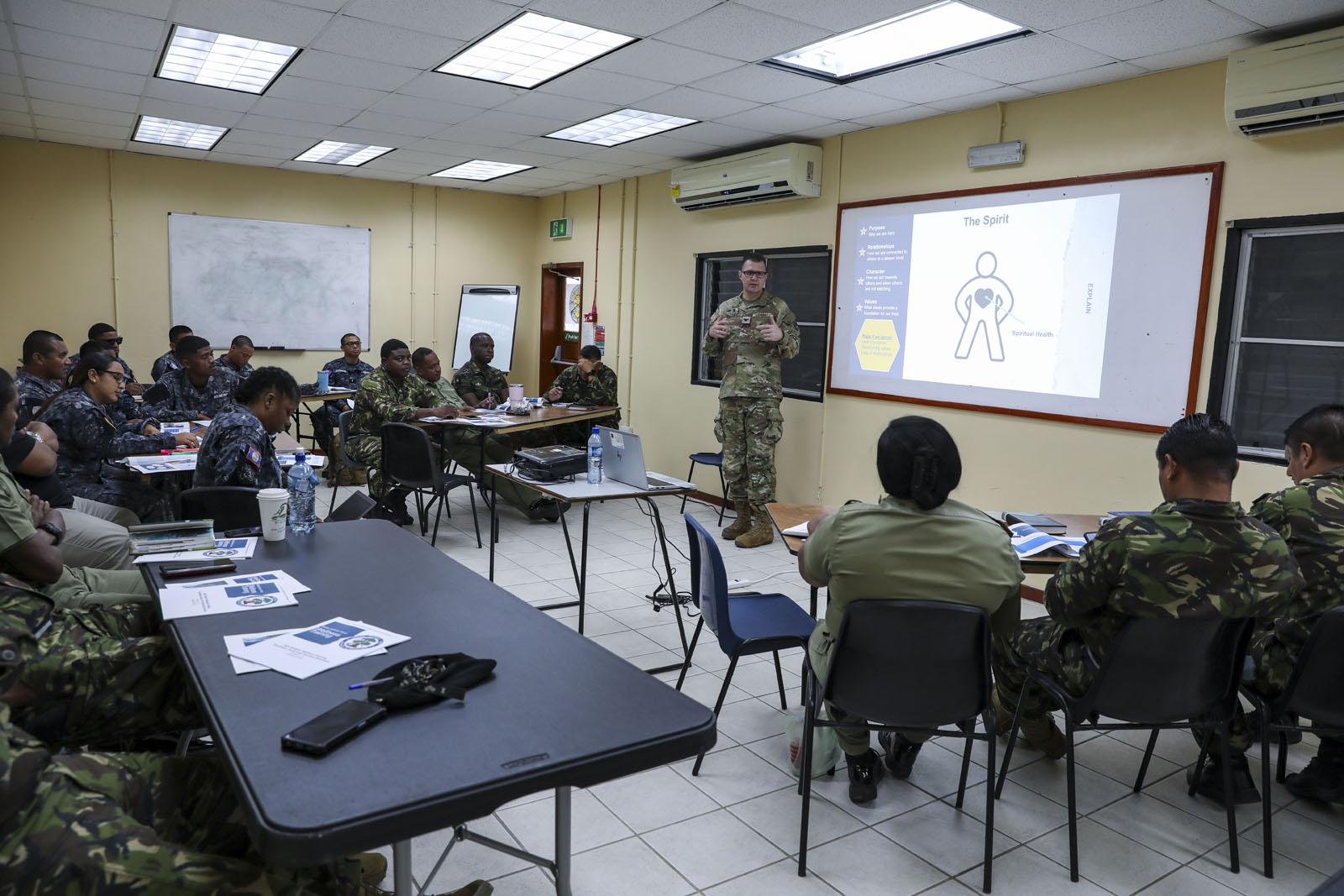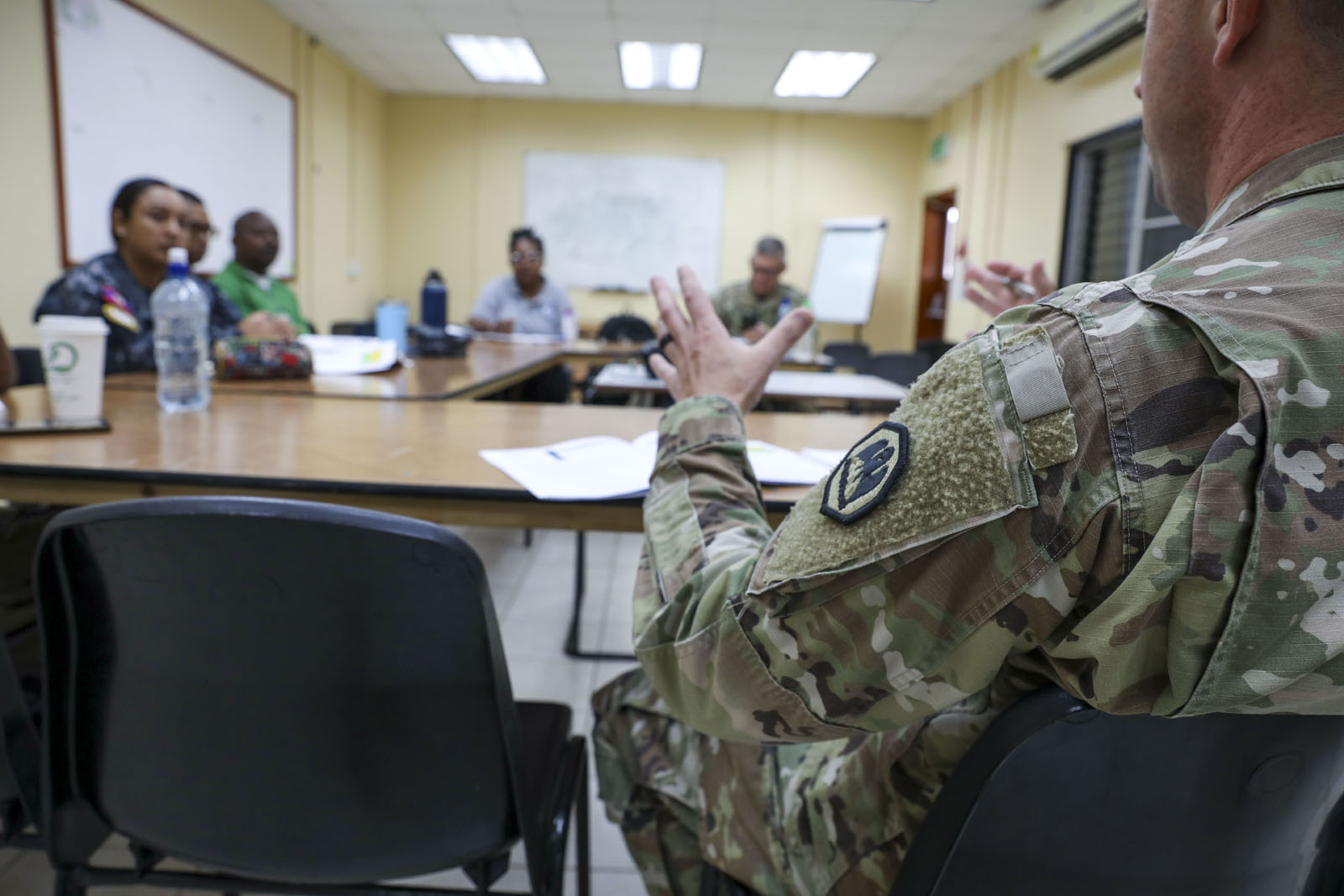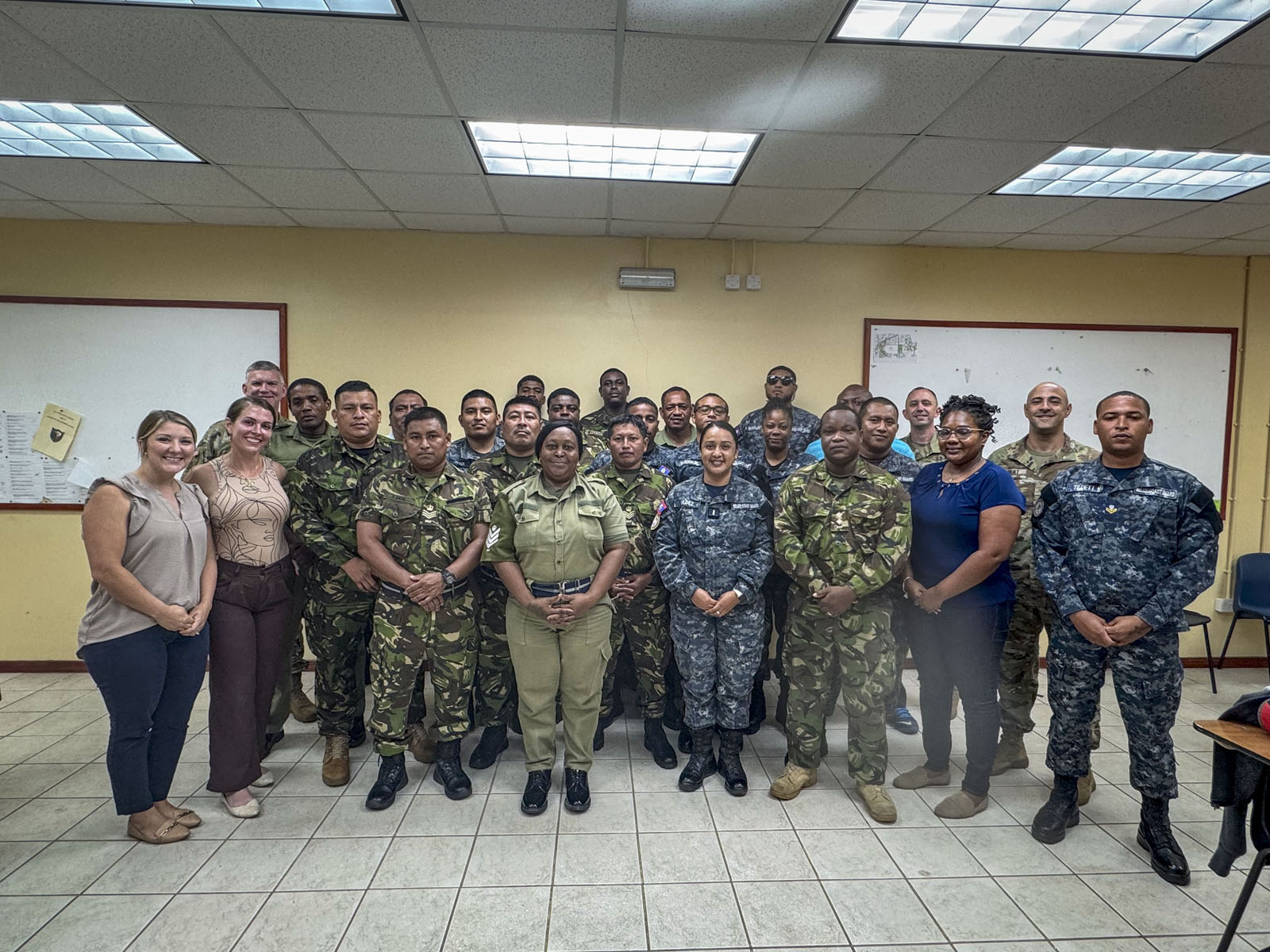La. Guard’s Health Promotion Programs support Belize Defence Force Wellness Exchange
By Staff Sgt. Noshoba Davis, Louisiana National Guard Public Affairs Office
 PINEVILLE, La. – “Nobody can take care of you better than you. You can’t pour from an empty cup; you need to think of ways to fill your cup. Keep in mind, sometimes your cup will go down before it fills up,” said Chaplain (Col.) Page Brooks, the Louisiana National Guard state chaplain, during the Belize Defence Force’s Wellness Exchange at Price Barracks in Ladyville, Belize in August.
PINEVILLE, La. – “Nobody can take care of you better than you. You can’t pour from an empty cup; you need to think of ways to fill your cup. Keep in mind, sometimes your cup will go down before it fills up,” said Chaplain (Col.) Page Brooks, the Louisiana National Guard state chaplain, during the Belize Defence Force’s Wellness Exchange at Price Barracks in Ladyville, Belize in August.
The Louisiana National Guard’s Resilience, Risk Reduction, and Suicide Prevention Program; Psychological Health Program and Chaplain Corps supported the exchange, hosted by the Belize Defence Force, to share wellness practices and promote mental health awareness among Soldiers, Airmen, and Sailors from Belize’s military branches.
Soldiers, Airmen and Sailors from Belize’s army, air force and coast guard participated in the Wellness Exchange. This exchange began in 2022 after a State Partnership Program request was made by the Belize Defense Force to receive support from the LANG in implementing a holistic wellness program for their forces.
Belize Defence Force Maj. Megan Aspinall, the force wellness officer, explained that the goal of the BDF’s Wellness Program is to provide a holistic approach to enhance the effectiveness and quality of life for service members and their families by providing support to them while working to reduce the stigma around mental health.
 “The BDF Wellness Program came about as the force recognized that the serving members were experiencing mental health issues that were affecting deployment readiness,” said Aspinall. “The Belize Defence Force has had a high rate of suicide and issues with reintegration. This effort is to help them establish their own system of training and policies.”
“The BDF Wellness Program came about as the force recognized that the serving members were experiencing mental health issues that were affecting deployment readiness,” said Aspinall. “The Belize Defence Force has had a high rate of suicide and issues with reintegration. This effort is to help them establish their own system of training and policies.”
Over the past two years, the LANG’s Health Promotion Programs and Chaplain Corps have worked closely with the BDF to support their wellness efforts. Through ‘train the trainer’ courses on resiliency, suicide intervention and peer-to-peer counseling, they have helped BDF leaders build internal capacity and address mental health challenges within their ranks. During the recent four-day exchange, LANG chaplains, counselors and program directors provided additional training to BDF front-line leaders, focusing on creating and tracking case management with the BDF wellness team and coast guard leadership.
“Beyond cultural differences, our servicemen and women experience the exact same stigma, risk factors, financial, and moral concerns. Most preventative efforts and processes need not be different, just formed and administered in a unique way that relates to the BDF’s specific population and community,” said Amber Sayer, Louisiana National Guard’s Resilience Risk Reduction and Suicide Prevention Program coordinator. “Our advisory team is honored to be supporting BDF leadership and the Wellness Program with efforts to successfully establish their internal program.”
“For the LANG, this exchange gives us the opportunity to improve how we train other leaders in our programs, while for Belize, they can reference a structure and system that is already functioning as they implement their own programs,” said Brooks. “During these exchanges, we also learn from the BDF wellness team and other branches about how they function. We have been amazed at how similar militaries are across countries and that the needs of Soldiers and families are very similar.”
 As part of the exchange, holistic wellness training was introduced to help BDF members understand the “Holistic Wellness Trifecta”-mind, body and spirit-and their role in reducing and preventing stigma. The training also aimed to identify resources available to the service members in Belize, reinforcing the holistic approach to wellness promoted by the program.
As part of the exchange, holistic wellness training was introduced to help BDF members understand the “Holistic Wellness Trifecta”-mind, body and spirit-and their role in reducing and preventing stigma. The training also aimed to identify resources available to the service members in Belize, reinforcing the holistic approach to wellness promoted by the program.
“We are realizing that we cannot treat Soldiers in one area of their lives alone, be it physical, mental, etc. We must treat each Soldier in terms of mental, emotional, physical and spiritual resilience and wellness,” said Brooks. “I am glad to say that the BDF has opened a wellness center where Soldiers can receive counseling. They have also increased the number of community resources available. Ultimately, they have dropped their rate of suicide from one every one to two months to only one in the last seven months.”
As the BDF Wellness Program has grown, Aspinall and her team have started working with other branches to provide support and resources to their service members while also building their own resources and programs.
 “Before, only one officer was employed as a counselor, but now the office is staffed with six service members and civilians who provide counseling. The department also has its own building now, which did not exist before,” said Aspinall. “It is important for us to work together because we conduct joint operations, and our coast guard currently does not have a wellness program, so it is vital that we give them support.”
“Before, only one officer was employed as a counselor, but now the office is staffed with six service members and civilians who provide counseling. The department also has its own building now, which did not exist before,” said Aspinall. “It is important for us to work together because we conduct joint operations, and our coast guard currently does not have a wellness program, so it is vital that we give them support.”
Aspinall and her team provide several resources to the service members, including counseling, self-care training, financial literacy, a peer counseling course, anger management training and yoga.
“Our Sailors have greatly benefited from the BDF’s Wellness Program by accessing structured mental health support and resilience training, which we wouldn’t have otherwise,” said Belize Coast Guard Lt. Junior Grade Susely Valdez, Zone 1 area commander, A Company, Fleet. “Since collaborating with Maj. Aspinall, I’ve observed a significant improvement in the morale and mental readiness of our Sailors. They are more aware of their mental health and have better coping strategies for stress and operational challenges.”
For leaders like Belize Coast Guard Lt. Junior Grade Jerry Vasquez, the goal during the exchange was to learn how to identify Sailors affected by mental health issues, how to assist them with the right tools to seek help, and how to teach his Sailors how to do the same.
 “These exchanges are important because, as young as our military organizations are, we have begun to see the effects that one’s personal and occupational lives come with,” said Vasquez, incoming area commander for A Company, Fleet. “This training is beneficial and something to be taken seriously. Suicide is no joke and should be a wake-up call for any organization. Measures must be put in place to prevent it from happening, and Sailors must be educated in identifying certain behaviors that could lead to it while knowing the plan and steps to take once these behaviors are identified.”
“These exchanges are important because, as young as our military organizations are, we have begun to see the effects that one’s personal and occupational lives come with,” said Vasquez, incoming area commander for A Company, Fleet. “This training is beneficial and something to be taken seriously. Suicide is no joke and should be a wake-up call for any organization. Measures must be put in place to prevent it from happening, and Sailors must be educated in identifying certain behaviors that could lead to it while knowing the plan and steps to take once these behaviors are identified.”
Moving forward, the LANG plans to continue working with the BDF wellness team through the State Partnership Program to provide training as requested and support for their case management system.
“We intend to have a monthly meeting with them to help in any way we can,” said Brooks. “We also plan to continue working with them in other ways, such as having virtual chaplain trainings.”

